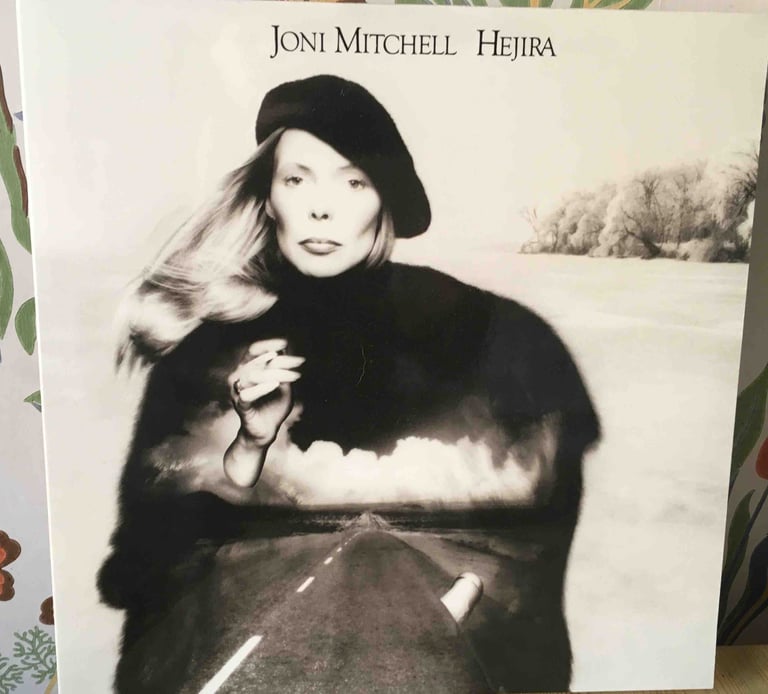FROM THE CRATE #3 'Hejira' by Joni Mitchell
In which I review old albums from a 3 crate vinyl haul in 2021. #3 Review of Joni Mitchell's 'Hejira'
I was driving across the burning desert
When I spotted six jet planes
Leaving six white vapor trails across the bleak terrain
Like the hexagram of the heavens
Like the strings of my guitar
Amelia, it was just a false alarm
Now breathe.
Recently I was writing a short story and in the first paragraph I used a double simile – I was conflicted about keeping them both. Similes are somewhat poetic, they twang like a telecaster guitar string (see what I did there) and they are addictive to the amateur writer. Avoid using too many, is the usual advice. But I can’t help but love them. And I’m not sure what poetry would be without them. I’m also not sure avoiding them is the best thing to do at all. Which brings me to the lyrics of the breathtaking song from Joni Mitchell’s Hejira (1976) ‘Amelia’. Amelia, the 2nd track of the album, came to my brain’s musical inbox before I heard the whole album of Hejira. (To my shame, that was only recently.) The version I fell in love with, a slower, moodier version, was on a collection recently released called Travelogue. The song was instantly, and remains, a desert island track for me. It’s one of the most beautiful and unique songs I have ever heard. To boot, my grandmother was called Amelia, my mother’s middle name is Amelia, and my youngest daughter – who I recall dancing ballet on my kitchen floor to this song – also has the middle name Amelia. Granted, the song is about Amelia Earhart but, then again, it’s really about so much more. It’s about – to these ears anyway – being stranded between here and there and the freedom of flight. It’s about being in love and not knowing if this love is good for you or not. And what is love, anyway? A false alarm? The song creates a mood with its gorgeous, hypnotic instrumentation. (Let’s not forget the inimitable Jaco Pastorius features on this album.) It delivers words and phrases that suggest: ‘until you get there, you’ll never really know’. (And, anyway, you’ll never really get there.) ‘Like Icarus ascending; on beautiful foolish arms’. You get the impression – it ain’t going to end well. So Joni opens this tune with a double simile in the first paragraph. ‘Like the hexagram of the heavens; Like the strings of my guitar’, and it’s so mystically beautiful and at the same time thoroughly explanatory (isn’t that what poetry is?) that you’re left breathless, and feeling so positive that when you sit down to write your next bit of fiction, you feel as if you can use as many similes as you like, fuck you very much.
So I begin a review of an album I am obsessed with, and I am trying not to blow my whole load on one song. Because I cannot emphasize enough just how beautiful Amelia is, and how important the tune has been for me over the years. How it delights me; how it makes me cry. How it somehow transcends ‘normal’ music. It is elevated. It really is something alien. I understand people will say things like: it’s not as good as River, though, is it? Or A Case of You? Or Both Sides Now. (The list goes on…) Well, all I can say is that there is a good argument for calling Joni Mitchell the greatest songwriter of all time. And if you are going out on a limb to make that statement there will always be a lot of follow-up argument about what her best song is. How could it be any other way? For me it’s easy. It’s Amelia. (No, not a false alarm.) And just for the record, I am not saying it’s my opinion Joni Mitchell is the greatest songwriter of all time. We all have our favorites, we all have those songwriters that speak deeply to us. It’s very personal at the end of the day. But I am sure Joni is high on the list of so so many. She is a gift. I envy those who are yet to unwrap the work of this most holy of heaven-sent sages.
So, given that I could write a whole book about the one song Amelia on its own, I have to give space to some of the other remarkable tracks on this record. The one song that most will instantly recognize is Coyote, with its open string, skip-rope, tongue-in-cheek, road-movie storytelling. You cant help but feel that your narrator, a weary, tried and true traveller, is far more wily than the predator she calls the coyote. There isn’t a woman out there who hasn’t experienced a coyote, right? The incorrigible guy that just wont take no for an answer? But there’s more than a little Thelma and Louise about our narrator. She’s got this, and this guy, well, he’s more than a bit pathetic, isn’t he?
What strikes you right away, listening to Coyote, is just how different it sounds. I can’t think of any song like it. It’s both disorienting, and at the same time it asks you to come along, take a ride, the desert welcomes you, and don’t you too want to be a prisoner of the white lines of the freeway? But what is this music? Is it rock? Pop? Folk? Jazz? Folk-jazz? Your answer is as good as mine. I love the smile on Joni Mitchell’s face when she sings this song in The Last Waltz. It’s almost as if she is way ahead of us. She knows we don’t understand and that we never will. We’re the coyote, aren’t we?
I confess, many of the other songs on this album were, until recently, new to me. I can hear the strains of impending jazz in Furry Sings the Blues, a plaintive harmonica grounds us to a bluesy feel, but Mitchell’s phrasing, it’s going jazz, isn’t it? It’s worth pointing out, at this point, Joni Mitchell’s voice is deeper than usual on this album. Furry Sings the Blues, by the way, seems to pre-empt a sound that Ricky Lee Jones’ very-good eponymous debut album, released just a few years later, (and also, happily, in my crate haul) is drenched in. Which, at the end of the day, isn’t a bad thing at all.
I like all the songs on this record, but the title track is possibly the next best stand out track. Backed by a very Pastorius bass, it begins: ‘I’m traveling in some vehicle; I am sitting in some café’ and you start to see a pattern. There’s more of this: Blue Motel Rooms and the gorgeous Refuge of the Roads. The metaphor of travel – to explain love and life, to give us the sense of journey with no end.
Generally, lyrics don’t often read well on paper. There are boundless arguments as to whether someone like Bob Dylan is a poet or not. My own opinion is that most of his work doesn’t hold up without the music (and I am a massive Bob Dylan fan). My point is that this song reads wonderfully, even without the music. But I would argue that all the songs on this album do (as they do, for the most part, on Blue too). Her words weave through movement, they journey through weather, the scale of view is desert-like, bright open skies, panoramic, and it all seems to hover around the disenchantment of love. And also the realization, at some point in her life, that love is holding this particular woman back: ‘We're only particles of change I know;
Orbiting around the sun; But how can I have that point of view; When I'm always bound and tied to someone’.
Clearly I’m not a woman, but I’ve learned enough about emotional dependence, and the fear of being alone, and the greater fear of being tied down combined with a sense of losing cherished independence. It’s why I get fully absorbed in Joni Mitchell’s songwriting. She understands the flimsiness of dichotomy, the self-destructive contrariness of human nature – she understands the greyness of being. There is the understanding of being lost or being in between. I love this confusion. It’s so human, and so poetic. But further, I love that she knows it, and is able to express my feelings so well.
Song for Sharon gives us the full gamut of Joni authenticity. A song for a friend she left behind when she departed Canada. Again: travel, movement, decisions sometimes beyond the power of the decider. Digging deep into Mitchell mythology, you get the impression she never wanted to leave the sweeping-plains farm and the frozen skater lakes of Canada. Meanwhile there’s a friend – the friend that had the ambition to become a great musician – who stayed behind. There’s that lovely sense of the hovering, suspended being, that also brings us back to the dissatisfaction with love that drives much of this album, that life never really serves us what we want. Or if it does, it merely propels us to want something else.
Many will take umbrage at my choice, but this is my favorite Joni Mitchell album. While Blue is devastating in its emotional disorientation, we get another Joni in Hejira. A more mature Joni. A woman that seems to know herself, even if she still hasn’t come to understand her place in life. (Because, let’s face it, like many of us, she never will.) She is still in between places, she is still somewhat lost, but she now seems resigned to her lot. And that’s not a bad thing. She is trying to stop at the wayside to feel the desert breeze. She is driving more slowly. She’s taking the scenic route. She doesn’t understand anything – men, nature, her goal in life – but at the same time, she now knows, she doesn’t need to.
The other thing to note is that Hejira is a very musical album. Musically Joni Mitchell is becoming more adventurous, and she takes flight and goes out on a limb on more than one occasion. She is also making it up as she goes along, in the best possible way, like the world-weary traveller in her songs. People often talk about ‘Joni’s funny tunings’ and that’s got a lot to do with her uniqueness, but on Hejira (and to some degree subsequent albums) there is a sonic reaching that goes beyond mere tunings. She is reaching for the sky, like Amelia Earhart in the plane that will ultimately bring her down. She is flying, because that’s what she can do. And she is showing us something that genuinely no one else is showing us, has shown us, or can show us. While Blue gives us something, perhaps, easier to digest, Hejira doesn’t even try. It gives us delicious, emotional moody flows of sonic energy and guile, but most importantly the hero of Hejira doesn’t bow to anyone or anything. She stands on her own, majestic and untouchable. Who else could make a record like this? I’m sorry, I don’t know of anyone. (Love you Joni xxx always.)




